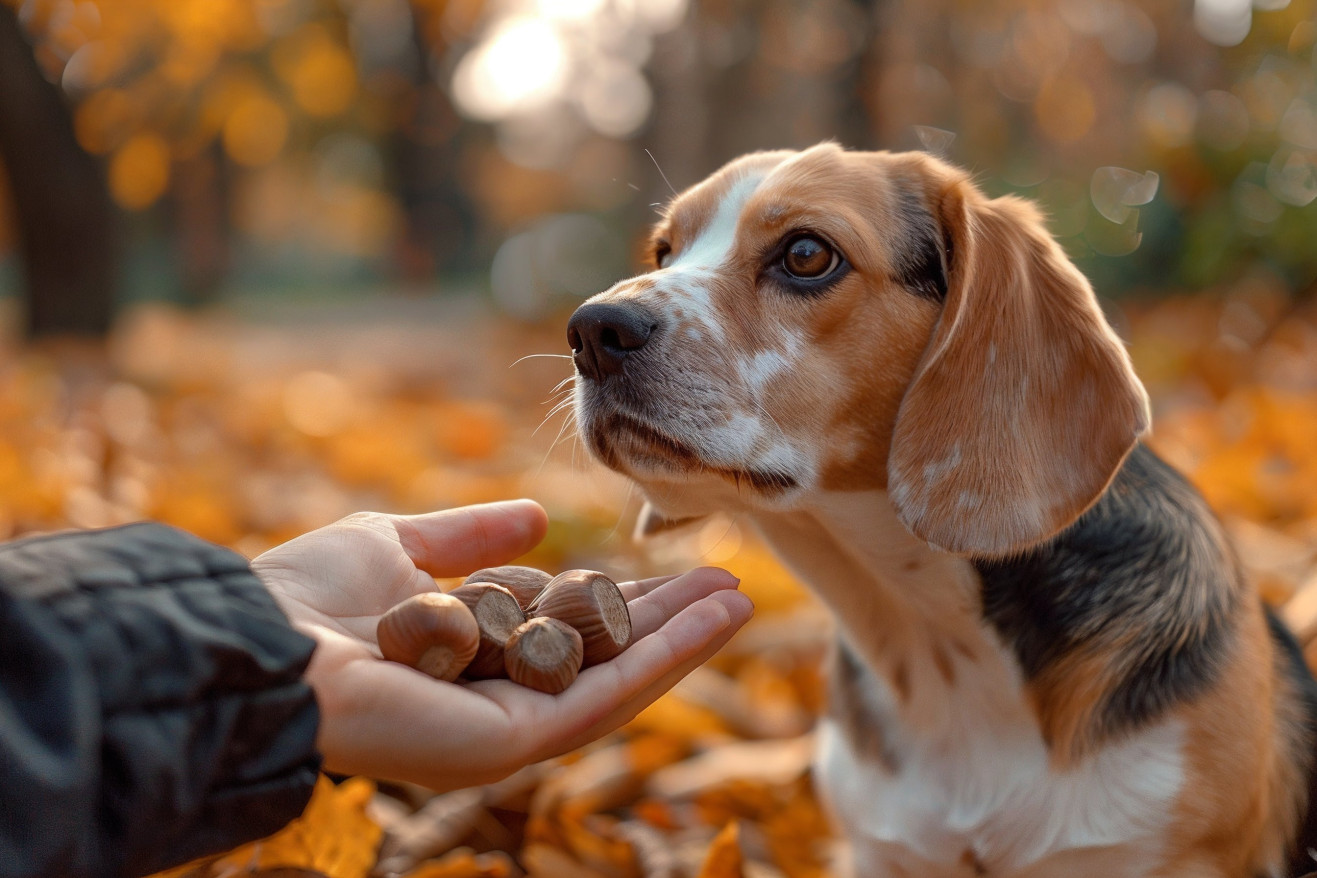Can Dogs Eat Chestnuts? A Nutritional Guide for Pet Owners
2 March 2024 • Updated 2 March 2024

Chestnuts roasting on an open fire may be a sign of the holiday season, but can you share this festive treat with your furry friend? The good news is that dogs can eat sweet chestnuts as long as they are not horse chestnuts or conkers.
However, there are a few things to keep in mind when feeding your dog chestnuts, including cooking them to make them easier to digest and less likely to cause an allergic reaction.
To help you determine if chestnuts are a good choice for your dog, we’ll cover nutritional breakdowns, advice from veterinary professionals, and information on food safety. We’ll also look at research on dog nutrition and digestion to give you a comprehensive understanding of how chestnuts may impact your dog. By the time you finish this article, you’ll know whether or not you want to add this seasonal nut to your dog’s diet.
Can dogs eat chestnuts?
Different Types of Chestnuts and Toxicity
Nuts can be confusing, and this is especially true for dog owners. While sweet chestnuts are safe and healthy for dogs, horse chestnuts (also known as conkers) are toxic. This is because horse chestnuts contain aesculin, a toxic compound that is a neurotoxin to dogs.
According to TrustedHousesitters.com, symptoms of horse chestnut poisoning in dogs include vomiting, diarrhea, and severe neurological symptoms like muscle tremors and ataxia. Silversurfers also warns that conkers can cause blockages and even respiratory failure in dogs.
When you’re foraging for chestnuts or picking them out at the store, it’s important to know the difference between the two types. Sweet chestnuts have a pointed end and are covered in a spiky husk, while horse chestnuts are more rounded and have a smooth, spiky shell.
Spoiled Hounds also warns against any chestnuts that have been seasoned or have any other additives, as these can be dangerous for dogs. By making sure your dog only eats the right kind of chestnuts, you can make sure they’re safe and understand how they can fit into your dog’s diet.
Nutritional Value and Health Benefits of Chestnuts for Dogs
Sweet chestnuts, which are not the same as the toxic horse chestnut, have a nutritional makeup that can provide dogs with additional health benefits.
According to BBC Good Food, chestnuts are a good source of fiber, which is good for the digestive system and acts as a prebiotic to help maintain a healthy gut flora.
They are also high in potassium and Omega-3 fatty acids, which are important for heart health, nerve function, and muscle movement. Meanwhile, Kate’s K9 Pet Care says that chestnuts are low in calories and fat, but they should not be used as a replacement for a well-balanced diet for dogs and should instead be used as a supplement.
WebMD explains that cooked chestnuts have antioxidants that can help promote heart health, while raw chestnuts have tannins that can lead to digestive upset.
When you’re thinking about feeding chestnuts to your dog, it’s important to think about their specific dietary needs and any potential allergies, as not all dogs will react well to chestnuts.
As an occasional supplement, chestnuts can be a nutritious treat that can help support your dog’s health. The important thing is to prepare them in a way that makes them easier to digest and reduces the risk of negative side effects, which means boiling or roasting them.
How to Prepare Chestnuts for Your Dog’s Snack Time
If you want to treat your pup to chestnuts, you can do so seasonally with the right preparation. MSU Extension notes that chestnuts are only made edible for human consumption through roasting, and the same is true for dogs.
To prepare chestnuts for your dog, roast them in an oven preheated to 300 degrees Fahrenheit for about 15 minutes, being sure to pierce them first to avoid the nuts exploding. Chestnuts can also be boiled for 8 to 10 minutes, which is another safe way to prepare them for dogs, according to RC Farms.
It’s important to note that any seasonings, salt, and spices should be avoided when preparing chestnuts for your dog, as they can be toxic.
It’s also important to remove the outer shell and inner skin to avoid choking hazards and to make it easier for your dog to digest.
After you’ve cooked and shelled the chestnuts, you can store them in airtight containers in the refrigerator for one to two months or the freezer for up to a year, according to MSU Extension. Keeping these treats in a cool, dry place will help ensure they stay safe and nutritious for when you’re ready to give your dog a tasty treat.
Watch Out for Chestnut Allergies in Dogs
While chestnuts can be a fun seasonal snack for dogs, it’s important to be aware of potential allergic reactions. According to BMC Veterinary Research, the most common food allergens for dogs are beef, dairy, and chicken, and nut allergies are less common.
However, as with any new food, there is a potential for your dog to be allergic to chestnuts. Look for symptoms like vomiting, diarrhea, skin irritation, or more severe reactions like anaphylaxis, which will require immediate veterinary care.
You should introduce chestnuts into your dog’s diet slowly and monitor them for any negative reactions.
A case of peanut-induced urticaria in a dog, as documented by PMC, emphasizes the importance of identifying and managing food allergies in pets.
If you notice any signs of an allergic reaction in your dog after they eat chestnuts, discontinue feeding them chestnuts and contact your vet. Make sure that the chestnuts are plain, prepared properly, and that your dog’s regular diet is nutritionally complete.
By doing this, you can make sure that you and your dog can enjoy chestnuts together and that you’ll know what to do if your dog has an allergic reaction.
Chestnuts and Dogs: A Final Word
After delving into the world of chestnuts and their relationship with dogs, it’s obvious that sweet chestnuts can be a safe and enjoyable treat for dogs in moderation. We’ve made it clear that it’s important to know the difference between sweet chestnuts, which are safe, and toxic horse chestnuts, to avoid the possibility of poisoning.
We’ve also stressed the importance of proper preparation, which means boiling or roasting without any additional ingredients, to ensure the treat is safe and free of any harmful substances.
As with any new food you introduce to your dog, make sure to give them a small amount of chestnuts at first to make sure they don’t have an allergic reaction. It’s also important to remember that while chestnuts offer a range of nutrients, they should be an occasional addition to your dog’s diet rather than a regular part of it, especially if you’re feeding them a nutritionally complete commercial dog food.
In conclusion, chestnuts can be added to the list of dog-safe human foods as long as you choose the right type and prepare them correctly. Keep these tips in mind and feel free to give your dog an occasional chestnut treat, always with their health and well-being in mind.


